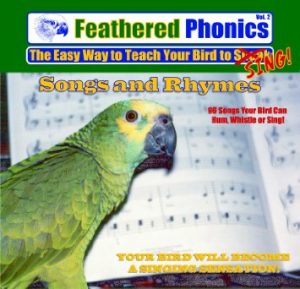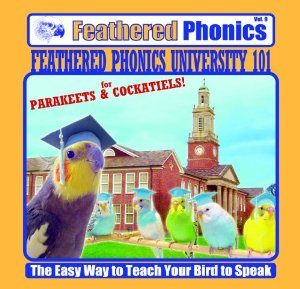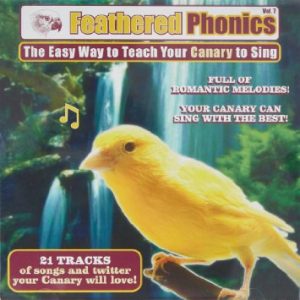Are you new to sharing your home with exotic companion birds? Don’t worry – Bird Cages 4 Less has your back. Welcome to our “How To” posts, a recurring series of articles dedicating to helping you be the best parront on the block.
Many people are fascinated by the parrot’s ability to learn and mimic human speech. Surely, there are some birds who harness a language and use it to their advantage – they can make up their own unique sentences, a new tune, and call their parront by their first name. Are you hoping to mold your parrot into a great conversationalist, but you aren’t quite sure how to go about it? Luckily, we have quite a few tools for you at Bird Cages 4 Less.
For the birds who seem to have a knack for singing a beautiful song, you’ll want to pick up Feathered Phonics Vol. 2!  Recommended for larger parrots who are known to have the gift of gab, this disc is packed with classic songs that are family-friendly and guaranteed to bring a smile to your face! A few favorites included in this training album are “Baa Baa Black Sheep”, “Happy Birthday”, and “How Much is that Doggie in the Window?”, but there are 96 tracks for your feathered friend to enjoy. With both whistled and sung versions of many songs, you’ll never quite know what your bird will pick up – but he’ll have plenty of stimulation to keep his bird brain occupied. We’d recommend leaving this to play while you’re out of the home running errands or working so your bird has peace and quiet to “study” his learning materials. You’ll be surprised how soon your Amazon, African Grey, or Macaw will begin to sing, whistle, and mish-mash the many songs he’ll learn from Feathered Phonics. Make sure to give your birds plenty of praise and special treats when they sing a song very well. Positive reinforcement is insurance that your bird will continue to sing songs he knows, and drive him to learn more!
Recommended for larger parrots who are known to have the gift of gab, this disc is packed with classic songs that are family-friendly and guaranteed to bring a smile to your face! A few favorites included in this training album are “Baa Baa Black Sheep”, “Happy Birthday”, and “How Much is that Doggie in the Window?”, but there are 96 tracks for your feathered friend to enjoy. With both whistled and sung versions of many songs, you’ll never quite know what your bird will pick up – but he’ll have plenty of stimulation to keep his bird brain occupied. We’d recommend leaving this to play while you’re out of the home running errands or working so your bird has peace and quiet to “study” his learning materials. You’ll be surprised how soon your Amazon, African Grey, or Macaw will begin to sing, whistle, and mish-mash the many songs he’ll learn from Feathered Phonics. Make sure to give your birds plenty of praise and special treats when they sing a song very well. Positive reinforcement is insurance that your bird will continue to sing songs he knows, and drive him to learn more!
Do you have a cockatiel or budgie who just loves to sing his heart out, but he only knows how to squeak or squawk?  Order Feathered Phonics Vol. 9 – specifically made with your tiny parrot in mind. With 66 tracks of whistled tunes and classic songs, your ‘tiel or budgie will be adding new sounds to his repertoire while you’re out at the grocery store! There are Christmas classics, whistle compilations, and other tunes to keep your little parrots happy and exercising their minds all day long. A few patriotic classics such as Yankee Doodle, My Country tis of Thee, and even Oh, Canada!, will be sure to impress you, and your bird will be very proud of himself! We’d recommend playing this album while you’re out of the home so your bird’s full attention is on studying – and learning – these timeless tunes. As recommended above, always give praise and provide special treats to your bird when he sings a song particularly well, or even just tries his best. By showing that singing and speaking result in treats, your bird will connect the dots and figure out that these are behaviors you really enjoy, and continue – especially when you reward him handsomely!
Order Feathered Phonics Vol. 9 – specifically made with your tiny parrot in mind. With 66 tracks of whistled tunes and classic songs, your ‘tiel or budgie will be adding new sounds to his repertoire while you’re out at the grocery store! There are Christmas classics, whistle compilations, and other tunes to keep your little parrots happy and exercising their minds all day long. A few patriotic classics such as Yankee Doodle, My Country tis of Thee, and even Oh, Canada!, will be sure to impress you, and your bird will be very proud of himself! We’d recommend playing this album while you’re out of the home so your bird’s full attention is on studying – and learning – these timeless tunes. As recommended above, always give praise and provide special treats to your bird when he sings a song particularly well, or even just tries his best. By showing that singing and speaking result in treats, your bird will connect the dots and figure out that these are behaviors you really enjoy, and continue – especially when you reward him handsomely!
Feathered Phonics didn’t forget about our small, non-parrot, bird owners in their series. Any bird  enthusiast whose kept canaries in the past or present has likely encountered the young, vibrant male canary who sings with all the gusto he can muster – but the poor little guy only knows one measly tune! Improved singing techniques may also aid the canary breeder who is having trouble matching up males and females! Canaries learn their songs from nearby adults who sing. If your canary is in a single-bird home, you can keep him on his toes with Feathered Phonics Vol. 7. Because canaries will not learn songs outside of their innate, native song patterns (you can learn more about that here), using other Feathered Phonics albums will not be effective. Feathered Phonics Vol. 7 is specifically geared toward teaching canaries and features only canary calls and songs; that means no human speech or singing! Leaving this album to play for your canary in the early morning will produce the best results as canaries sing most in the morning sunlight. While parrots need extra encouragement to keep singing, canaries sing for the joy of it all – just provide him with treats because he’s so darn cute.
enthusiast whose kept canaries in the past or present has likely encountered the young, vibrant male canary who sings with all the gusto he can muster – but the poor little guy only knows one measly tune! Improved singing techniques may also aid the canary breeder who is having trouble matching up males and females! Canaries learn their songs from nearby adults who sing. If your canary is in a single-bird home, you can keep him on his toes with Feathered Phonics Vol. 7. Because canaries will not learn songs outside of their innate, native song patterns (you can learn more about that here), using other Feathered Phonics albums will not be effective. Feathered Phonics Vol. 7 is specifically geared toward teaching canaries and features only canary calls and songs; that means no human speech or singing! Leaving this album to play for your canary in the early morning will produce the best results as canaries sing most in the morning sunlight. While parrots need extra encouragement to keep singing, canaries sing for the joy of it all – just provide him with treats because he’s so darn cute.
How did you teach your bird to speak a certain phrase, or sing a certain tune? We’d love to hear from you in the comments section below! Check back in with us often at Bird Cages 4 Less for more tips and information to keep your companion parrots, and songbirds!, happy and healthy.
3,004 total views, 3 views today
